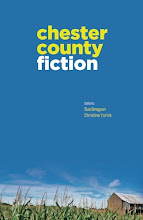The
anthology is scheduled for release this Sunday, October 27, 2013.
There will be a book release party at Nestology in the King of
Prussia Mall, from 1 to 3 pm.
In
advance of this book release, we interview some of the authors who
have work in this anthology. (This is Part One of the interview.)
Let's
start with a quick, easy question: Who is your favorite author, the
one whose writing inspires you or the one you'd like to write like?
Sarah
Cain:
I'm
a great fan of Shirley Jackson. “The Lottery” still gives me
chills.
Tony
Conaway:
Among contemporary authors, Michael Chabon.
Sue
Drummond: Oh,
so many! I like Annie Proulx, John LeCarre, Amy Tan, Scott
Fitzgerald, Richard Russo, Yann Martel, CS Forester. . . even got
into Faulkner this year. I am a voracious
reader. Presently reading Tea Obrecht. Just finished How
to Get Filthy Rich in Rising Asia.
So many good books!
Julie
Duffy:
My first favorite author was Douglas Adams (I could recite Vogon
poetry at age nine...). Having been weaned on him, I went on to
discovered Neil Gaiman, Terry Pratchett, and of course PG Wodehouse,
Mark Twain, T. H. White. George MacDonald Fraser is another wonderful
humorist. I really admire TV writers Joss Whedon, Stephen Moffat,
Russell Davies and Jane Espenson for their storytelling and
heartbreaking use of tension and humor. I've always been a fan of
mysteries --- sneaking copies of my mother's Dick Francis
horse-racing thrillers off a high shelf at a young age probably
caused my love of page-turners. Recent favorites include Ellis Peters
and Elizabeth Peters and (I know, I'm late to the party) Agatha
Christie and Arthur Conan Doyle. I fell in love with Arthur C.
Clarke's use of the Big Idea as a teenager and that was my gateway
drug into Stephen Jay Gould's non-fiction and John Donne's poetry as
well as other sci-fi, including Isaac Asimov, Ben Bova, H. G. Wells
and Neal Stephenson. And I haven't even started on the historical
fiction writers yet...
Joan
Hill: My current favorite
author is Elizabeth Berg, whose realistic fiction reaches some gritty
truths. I am also very much enjoying Aimee Bender’s work. She is
quirky and original.
Tom
Joyce: Asking me to name my
favorite author is kind of like asking me to name my favorite song or
movie. It’s the kind of thing that changes on an hourly basis. But
one name that comes to mind immediately is Elmore Leonard. A lot of
people justly praise his quirky touches and arch tone. But I think
his greatest quality was his solid craftsmanship. The man knew how to
construct a sturdy story arc.
Walter
Lawn:
Every American who writes poetry does it in a constant struggle with
Emily Dickinson. You may try to pretend she's not there, but she
always is. More immediately, though, I love Paul Zimmer's poetry -
affectionate, humorous, intimate - he has an amazing, light touch in
his deepest moments. I want to be him.
Matt
McGeehin: Mary Higgins Clark was the first fiction writer I
remember reading.
Robert Charles Mercer:
There have been many authors that have inspired me. To name a few,
there's George R. R. Martin, S. M. Stirling, Robert Charles Wilson,
and Stephen King.
How
long have you been writing?
Tom
Joyce: A very long time or a
very short time, depending on how you look at it. I worked as a
newspaper reporter for nearly 20 years, and I did a lot of writing in
that capacity. But I started writing fiction only a few years ago. I
discovered that fiction writing is like newspaper reporting in the
respect that it’s a frequently aggravating and nerve-wracking
process, but ultimately rewarding enough to get you through the rough
spots.
Martha
Nawrocki:
I
have been writing since I was 12 years old but just for fun. In high
school I had a really excellent English teacher who taught the
fundamentals of writing. His lessons gave me the basic tools to
produce well constructed papers. I was an English major in college
but wound up in the computer industry as a programmer and knowledge
engineer. I did a lot of technical writing along the way, so I really
have been writing for most of my life.
Sarah
Cain:
I've
been writing over 25 years, mostly non-fiction--speech-writing, video
scripts, op-eds, brochures, etc.
Matt
McGeehin: Fiction
writing, I started in high school. Being a meek, nerdy type, that was
my way of coping with all of the crap that comes from high school.
Julie
Duffy: It sounds like a
cliche, but as a youngest child I was 'writing' before I could write.
I remember lying on the floor dragging a pencil over a sheet of paper
in imitation of my siblings before I even started school. Once I
could finally make the right shapes, I was off. I read and wrote
incessantly...until they started to teach us to appreciate literature
(around the age of 12) at which point my writing screeched to a halt.
I didn't write creatively again until after I'd graduated from formal
education. Since then I've been working on and off on my creative
writing. Things really picked up when I launched the StoryADay May
challenge in 2010 and discovered a lurking community of would-be
writers online, desperate for 'permission' to write creatively again.
Walter
Lawn: When I was 6
or 7, frustrated that there were no more sequels to The
Wonderful Flight to the Mushroom Planet,
I wrote my own. I haven't stopped since. My penmanship has not
improved.
And
that's all we have room for in this post. Please join us this Sunday
for the book release party of Unclaimed
Baggage, and look for Part Two of
our interviews with the authors!
